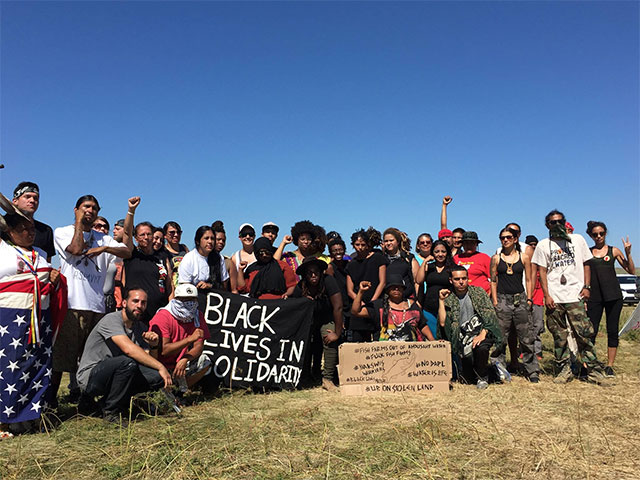
Last weekend, as thousands of Indigenous protesters continued their efforts to ward off construction of the Dakota Access Pipeline, a delegation from another life-and-death struggle visited the Native encampments in Standing Rock, North Dakota. While there have been numerous expressions of solidarity between Black Lives Matter organizers and Indigenous activists, this meeting marked a historic moment, as organizers from different fronts of struggle met in a place that has galvanized Native resistance to environmental racism in the United States. This week, Miski Noor, an organizer with Black Lives Matter Minneapolis, took a moment to discuss the trip with Truthout, and to explain why she and others felt the journey was necessary.
What moved you and other Black organizers to travel from Minneapolis to the frontlines of the #NoDAPL struggle? What was the discussion behind that decision like?
It was really important to me to show up for Indigenous folks and for #NoDAPL. I think many times resistance is romanticized and we picture it differently in our minds, as opposed to what it actually looks like in real time. I recognized that this fight against the Dakota Access Pipeline is [a] critical fight for ALL of us. This isn’t just an Indigenous issue; water is life for all of us and we have a responsibility to the Earth and future generations to protect it. While at the camp, I heard over and over again from Native folks how they have shown up in their cities across the country for Black lives. As BLM [Black Lives Matter], we have built power and we have a platform. And as a movement, we have a duty to uplift and amplify the stories and struggles of all marginalized folks, as our liberation is intertwined. The history of genocide and stolen land and stolen labor in America will forever link Black folks and Indigenous folks (and let us be clear that the two are not mutually exclusive), as there can be no Black liberation without Indigenous sovereignty.
How many Black organizers made the trip, and what was the welcome you received in Standing Rock like? What struck you about the camp, in terms of what you saw or heard upon arriving?
There were about a dozen of us who made this trip, and more folks are organizing to go again in the coming weeks. Our family in the camps welcomed us lovingly. It is a well-run community at the camps, as people have created systems that actually meet people’s needs. Food, shelter, safety and more are discussed at nightly camp meetings. As you walk through the camp, you can’t pass a tent or teepee without coming across a “hello” or a smile. I was struck by the sense of community and how yet again, we as people coming together illustrate that scarcity is a myth, and that capitalism desperately needs this myth to survive.
Can you tell us a bit about your conversations, or any circles or events you participated in during your visit?
One of the most important things I did there was listen. I learned an incredible amount in a short period of time, mostly through storytelling. I listened to stories from Native youth about their everyday lives — growing up on reservations and small towns and big cities across the country. I learned about ancestral histories and the many conflicts that Indigenous Nations set aside to come together to protect the water, and that this is the largest gathering of Indigenous Nations since 1973. Every morning, Indigenous women from all Nations come together and march to the river, and on Sunday morning, we were invited to join them. We walked into the river together, both praying to the water and for the water. Several women then shared their testimonies and we all took a pinch of tobacco and released it into the water. It was a healing ceremony, and I will forever be grateful for that.
Do you think there’s something special happening, in this historic moment, at the intersection of Black and Brown struggles?
Yes, completely. This moment is a gift, an opportunity for all of us to put our politics into practice. Solidarity is a buzzword for progressives, something we rarely see in action in a meaningful way. This is a fight being led by Indigenous communities and it is our duty to show up for one another if freedom and liberation is really the end goal. Our movements are stronger when we do this.
Will the power of solidarity between Black and Brown peoples help us all get free?
I believe we must step beyond solidarity, and that Black and Brown power will get us free. We do not have the resources that multibillion dollar corporations and oil companies have, but if we frame the conversation and victory in ways that make sense for our peoples, we do not need their resources. We do not have to fight on their terms, which are dictated by white supremacy and based on current systems of injustice — in fact, it is the opposite. Our power is in our relationships, and one of our main focuses should be relationship building and building movement cultures based on collaboration and reciprocity.
Trump is silencing political dissent. We appeal for your support.
Progressive nonprofits are the latest target caught in Trump’s crosshairs. With the aim of eliminating political opposition, Trump and his sycophants are working to curb government funding, constrain private foundations, and even cut tax-exempt status from organizations he dislikes.
We’re concerned, because Truthout is not immune to such bad-faith attacks.
We can only resist Trump’s attacks by cultivating a strong base of support. The right-wing mediasphere is funded comfortably by billionaire owners and venture capitalist philanthropists. At Truthout, we have you.
Our fundraising campaign is over, but we fell a bit short and still need your help. Please take a meaningful action in the fight against authoritarianism: make a one-time or monthly donation to Truthout. If you have the means, please dig deep.